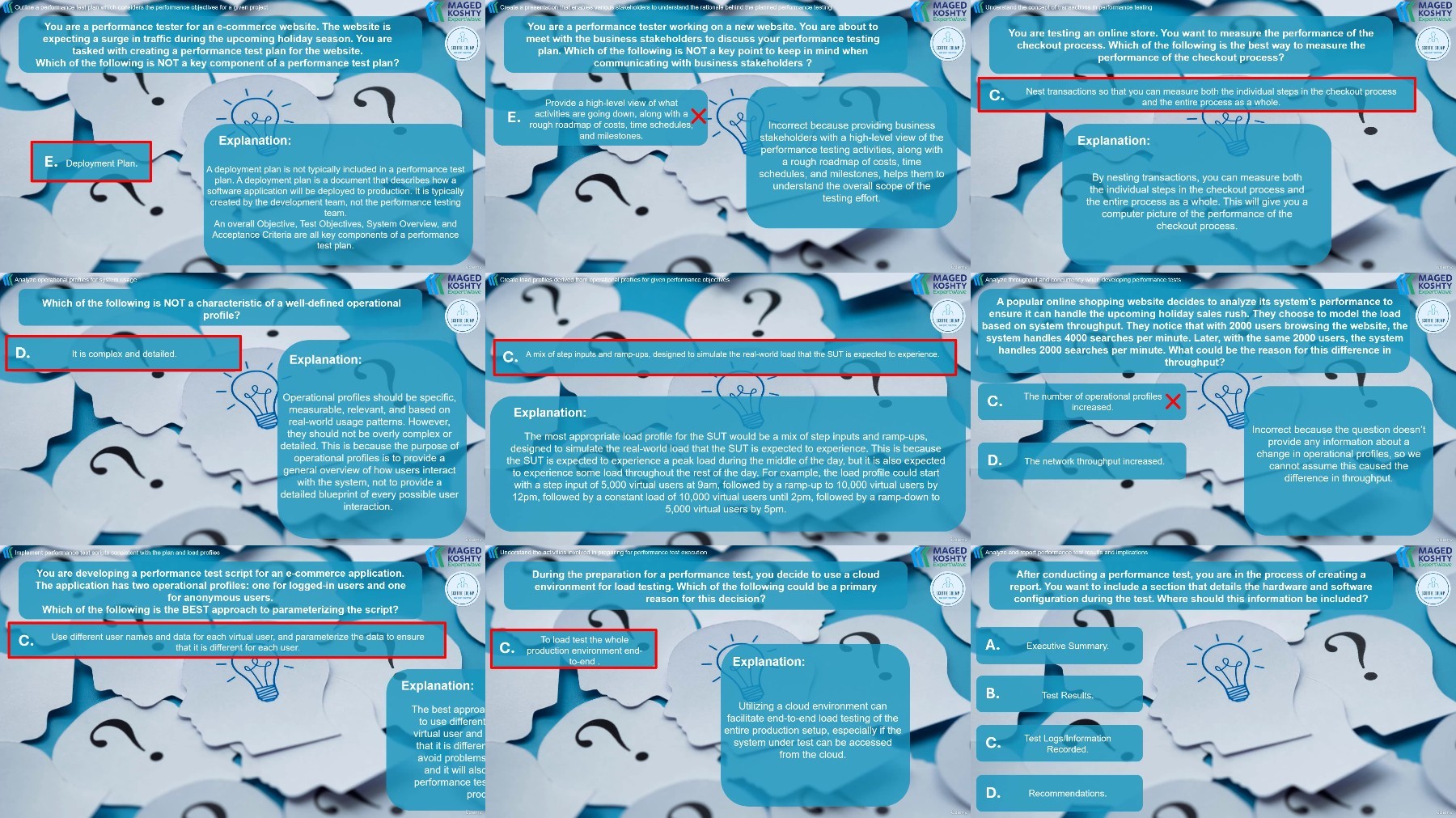
Istqb Performance Testing
Published 5/2024
MP4 | Video: h264, 1920x1080 | Audio: AAC, 44.1 KHz
Language: English
| Duration: 4h 28m
Master Performance Testing: Fundamentals, Metrics, Test Planning & Tool Selection.
What you'll learn
Grasp the fundamental principles of performance efficiency and the methodologies used in performance testing.
Identify and articulate performance risks, objectives, and prerequisites to fulfill the expectations and requirements of stakeholders.
Gain insight into performance metrics and the strategies for their collection.
Formulate a comprehensive performance testing strategy that meets specific goals and requirements.
Design, develop, and conduct preliminary performance tests.
Interpret and communicate the outcomes of performance tests, outlining their significance for different stakeholder groups.
Understand and convey the procedures, justifications, findings, and impacts of performance testing to a diverse audience.
Recognize various performance testing tools, their applications, and the criteria for selecting them.
Assess the integration of performance testing activities within the overall software development lifecycle.
Requirements
No experience needed. You will learn everything you need to know.
Description
This comprehensive course is tailored for individuals aspiring to earn the ISTQB® Performance Testing Certification or those seeking to expand their understanding and skills in performance testing. Throughout the course, participants will immerse themselves in the fundamental principles, methodologies, and tools essential for efficient performance testing.Benefits of Performance Testing Certification:By achieving the ISTQB® Performance Testing Certification, you will be empowered to:Comprehend the fundamental concepts of performance efficiency and performance testing.Identify and define performance risks, objectives, and requirements to meet stakeholder expectations.Master the techniques for collecting and analyzing performance metrics.Formulate and implement detailed performance test plans to meet specific objectives.Design, develop, and execute foundational performance tests.Evaluate and communicate the outcomes of performance tests to stakeholders effectively.Understand and articulate the process, logic, and impact of performance testing to diverse audiences.Identify, evaluate, and select appropriate performance testing tools based on project needs.Integrate performance testing strategies seamlessly within the software development lifecycle.Why you should take this course:Our course covers all facets of performance testing as outlined in the ISTQB® Performance Testing syllabus, including technical, methodological, and organizational aspects. Tailored for software testers looking to delve into performance testing or professionals aiming to initiate a specialized career in this domain, this program also serves those involved in performance engineering seeking a deeper understanding of performance testing concepts.Furthermore, the course is structured to provide practical insights and real-world examples, ensuring a profound understanding of how to apply theoretical knowledge. Participants are guided through the performance testing process, from the initial planning and design to the execution and analysis of tests, culminating in effective communication of findings to stakeholders.Enroll now and embark on your journey to becoming an ISTQB® Certified Tester in Performance Testing!Disclaimer: This course material is not accredited by the ISTQB®.ISTQB® is a registered trademark of the International Software Testing Qualifications Board.
Overview
Section 1: Basic Concepts
Lecture 1 Introduction to Basic Concepts
Lecture 2 Principles of Performance testing
Lecture 3 Types of Performance Testing
Lecture 4 Static Testing: Testing Types in Performance Testing
Lecture 5 Dynamic Testing: Testing Types in Performance Testing
Lecture 6 The Concept of Load Generation
Lecture 7 Common Performance Efficiency Failure Modes and Their Causes
Lecture 8 Performance Basic Concepts Q&A
Section 2: Performance Measurement Fundamentals
Lecture 9 Introduction to Performance Measurement Fundamentals
Lecture 10 Why Performance Metrics are Needed?
Lecture 11 Collecting Performance Measurements and Metrics
Lecture 12 Selecting Performance Metrics
Lecture 13 Aggregating Results from Performance Testing
Lecture 14 Key Sources of Performance Metrics
Lecture 15 Typical Results of a Performance Test
Lecture 16 Performance Measurement Fundamentals Q&A
Section 3: Performance Testing in the Software Lifecycle
Lecture 17 Introduction to Performance Testing in the Software Lifecycle
Lecture 18 Principal Performance Testing Activities
Lecture 19 Categories of Performance Risks for Different Architectures
Lecture 20 Performance Risks Across the Software Development Lifecycle
Lecture 21 Performance Testing Activities
Lecture 22 Performance Testing in the Software Lifecycle Q&A
Section 4: Performance Testing Tasks
Lecture 23 Introduction to Performance Testing Tasks
Lecture 24 Planning: Deriving Performance Test Objectives
Lecture 25 Planning: The Performance Test Plan
Lecture 26 Planning: Communicating about Performance Testing
Lecture 27 Analysis, Design and Implementation: Typical Communication Protocols
Lecture 28 Analysis, Design and Implementation: Transactions
Lecture 29 Analysis, Design and Implementation: Identifying Operational Profiles
Lecture 30 Analysis, Design and Implementation: Creating Load Profiles
Lecture 31 Analysis, Design and Implementation: Analyzing Throughput and Concurrency
Lecture 32 Analysis, Design and Implementation:Basic Structure of a Performance Test Scrip
Lecture 33 Analysis, Design and Implementation: Implementing Performance Test Scripts
Lecture 34 Analysis, Design and Implementation: Preparing for Performance Test Execution
Lecture 35 Execution
Lecture 36 Analyzing Results and Reporting
Lecture 37 Performance Testing Tasks Q&A
Section 5: Performance Tools
Lecture 38 Introduction to Performance Tools
Lecture 39 Tool Support
Lecture 40 Tool Suitability
Lecture 41 Performance Tools Q&A
This course is for anyone who wants to enhance their performance testing skills or earn the Certified Tester Performance Testing (CT-PT) certification.

Free search engine download: ISTQB Performance Testing






